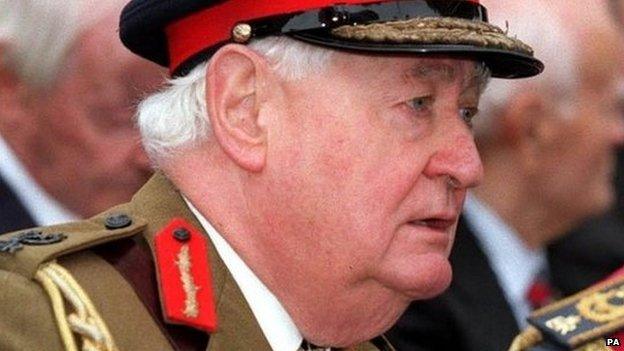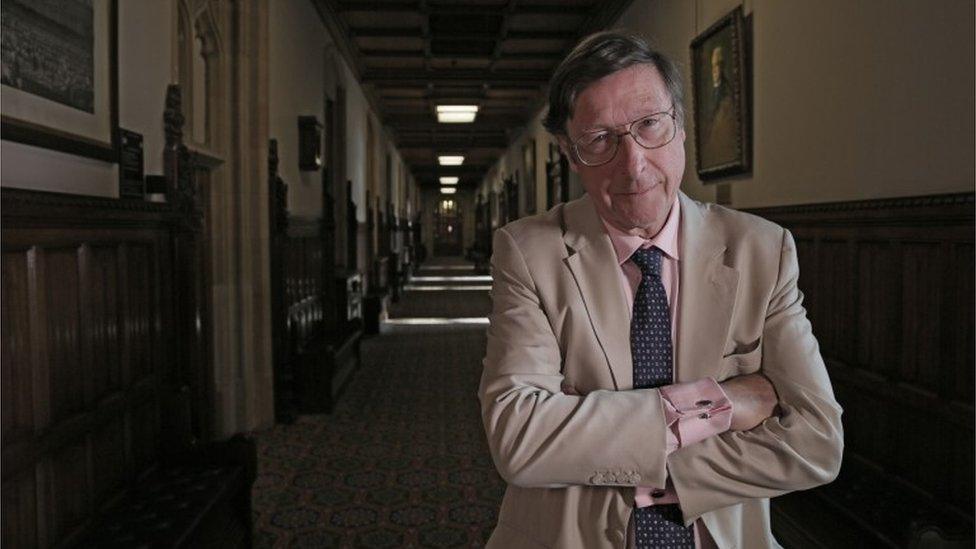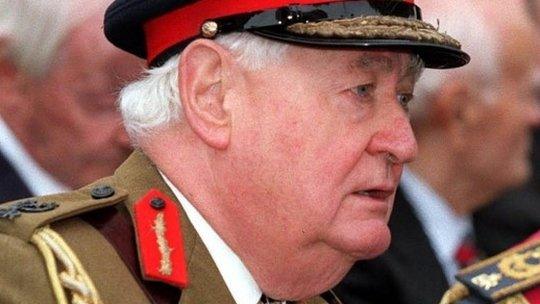Lord Bramall: Ex-army head to face no action on child abuse claims
- Published

Friends of Lord Bramall said he had been put through "absolute hell"
Former head of the Army Lord Bramall has said he is pleased he faces no further action in connection with allegations of historical child abuse.
Lord Bramall, 92, was interviewed under caution by police on 30 April 2015.
The peer, who was not arrested and has always denied the allegations, told the BBC he had received a letter from the Metropolitan Police clearing him.
Friends of Lord Bramall criticised the police investigation and said the peer had been put through "absolute hell".
The Met confirmed on Friday that it had told a man in his 90s no further action would be taken against him.
'Insufficient evidence'
Lord Bramall, a Normandy veteran who retired from the House of Lords in 2013, told the BBC "There wasn't one grain of truth" in the allegations, made against him by a man in his 40s.
He said the letter the Met had sent him was "pretty grudging, but at least I'm in the clear".
Lord Bramall added it was "complete self-justification" by the police, who he said "had not behaved very well".
The Met said it had informed a man in his 90s who was interviewed on 30 April 2015 by officers working on Operation Midland that he would face no further action.
The force added: "Following a thorough investigation officers have concluded there is insufficient evidence to request the Crown Prosecution Service to consider charging the man with any offences."
Operation Midland is part of a wider umbrella of investigations by Scotland Yard, dubbed Operation Fairbank, into allegations of abuse involving senior politicians and high-profile figures.
It has focused on the Dolphin Square estate in the Pimlico area of London.
'Utterly inconceivable'
Anthony Stansfield, the Police and Crime Commissioner for the Thames Valley, who also served as a platoon commander under Lord Bramall, condemned the police investigation.
"This is a man who has commanded our nuclear deterrent, was in charge of all our armed forces," he told BBC Radio 4's Today programme.
"He would have been surrounded by staff, he would have had a very, very detailed diary of every day. It is utterly inconceivable and the slightest investigation would have shown that.

Sir Max Hastings said police had lost sight of "justice and fairness"
"Instead they seem to have barged into the house of a 92-year-old. His wife was dying of Alzheimer's in the house... The victim in this entirely is Field Marshal the Lord Bramall."
The military historian and friend of Lord Bramall, Sir Max Hastings, told Today the peer had "been through absolute hell" over the claims.
He said that in pursuing investigations of historical abuse police had lost sight of a "sense of justice and fairness" towards those accused.
Sir Max said "decency demanded" that the police apologise to Lord Bramall for his treatment. He said their failure to do so was "not good enough" and reflected badly on the Met.
'Professional and impartial'
The Met said in September in defence of its actions during Operation Midland that its investigations are conducted "without fear or favour, in a thorough, professional and impartial fashion".
Lord Bramall served during the D-Day landings during World War Two and commanded UK land forces between 1976 and 1978.
He became chief of the general staff - the professional head of the Army - in 1979, and in 1982 he oversaw the Falklands campaign.
Later that year he became chief of the defence staff - the most senior officer commanding the UK's armed forces.
- Published30 April 2015
